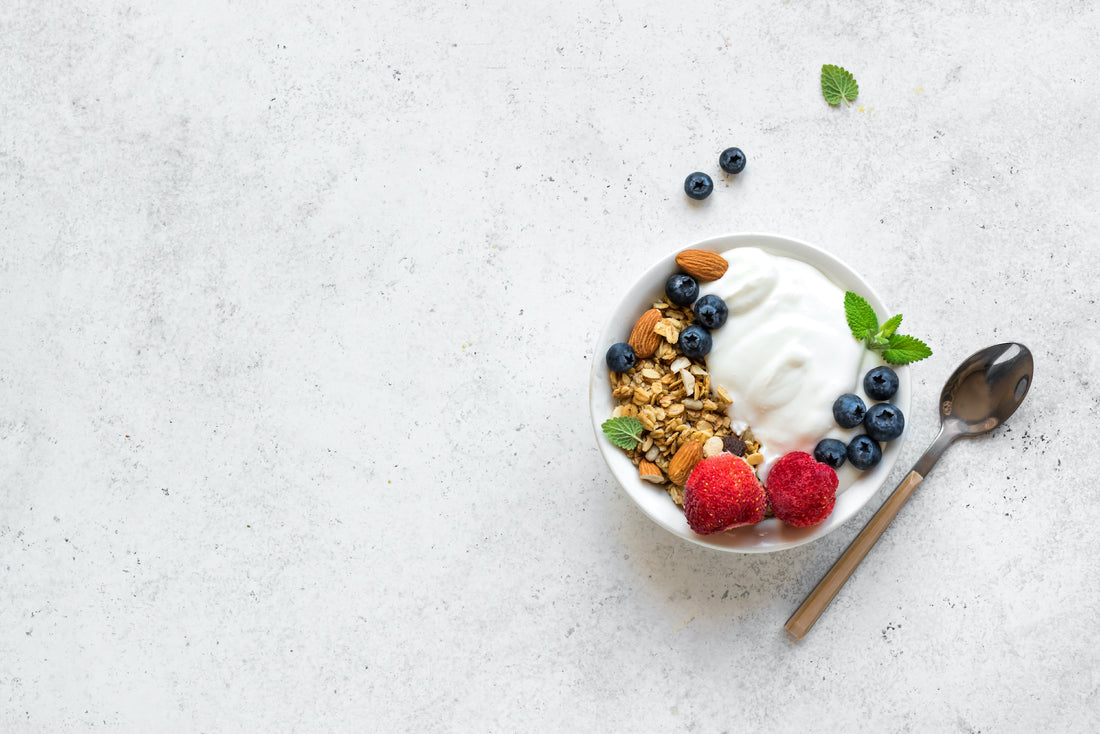Reviewed by Anneleen Segers, PhD
If you are looking for ways that you can naturally support your gut health through your dietary intake then you are on the right track. In addition to a prebiotic or probiotic supplement, there are ways that you can support positive gut health by eating a diet that is rich in plant foods, including foods that are rich in prebiotics and probiotics.
We take a look at how your diet can affect the microbiota in your gut impacting your gut and your overall health and well-being.
The Importance of Achieving Good Gut Balance
Improving your gut bacteria is important in supporting not only your gastrointestinal health but also your immunity and overall health. Your microbiota in your gut can paint a pretty good picture of your overall health and wellness. There are many factors that affect your gut microbiota balance.
Sometimes our gut ecosystem is disrupted by environmental factors, stress, medications, nutrient sparse diets, and even poor sleep hygiene. That is why we want to be sure that we can support our microbiome by choosing a lifestyle that supports a diverse, nutrient-rich diet with prebiotics and probiotics, regular physical activity, and stress management.
Positive balance includes an ecosystem with a diverse population of beneficial bacteria or probiotics. Some probiotics in the gut biome include Akkermansia muciniphila, which promotes health by protecting the host from harmful pathogens and maintaining a strong intestinal barrier. When supplementing, to ensure probiotics reach the intestines without degradation, researchers discovered a way to pasteurize Akkermansia muciniphila. In doing so, this probiotic through the pasteurization process becomes a postbiotic, which has a higher success rate of reaching the gut due to its stability. This postbiotic is called Akkermansia MucT™.
Being able to assess how you are currently eating is probably your best place to start. Let's start digging now!
Ways That Foods Support Gut Health
Increase Your Dietary Fiber
If you heard this your 'whole life', get ready to hear it again — increase your dietary fiber. There is much credit to be given to the role of fiber in our diets. It helps to keep your gastrointestinal (GI) tract healthy and also may support the gut in your gut microbiome.
Most plant foods provide dietary fiber which is found primarily in fruits, vegetables, whole grains and legumes, and should be part of your daily dietary intake. In addition to fiber, these foods also provide important nutrients like vitamins, minerals, and even some macronutrients like carbohydrates, proteins, and fats.
Consuming adequate fluids with fiber may help to facilitate the movement of digested food through your digestive system and out of your body. The transit of waste material daily is important to alleviate hard stools or constipation. In fact, there are two types of dietary fiber that both play a very integral role in our gut health.1
Soluble fiber
Dietary fiber like soluble fiber dissolves in water and may support certain processes in the body. For example, soluble fiber may help to keep blood glucose levels homeostatic and also support healthy lipid metabolism. Sources of soluble fiber include apples, figs, pears, avocados, black beans, kidney beans, lima beans, brussels sprouts, sweet potatoes, and broccoli.
Insoluble fiber
This type of fiber doesn't dissolve in water and remains intact, thereby helping to move material through your GI tract to support healthy stool consistency and frequency. Try adding foods that are good sources of insoluble fiber to your diet like nuts, seeds, wheat bran, whole grain foods, and quinoa. Some foods with soluble fiber, such as legumes, brussels sprouts, broccoli, and apples, also contain insoluble fiber.
So what's the goal? Well according to the Academy of Nutrition and Dietetics (AND), the recommended amount of dietary fiber is about 25 grams for women and 38 grams for men each day, however, each person's nutritional needs are different.2
So, as you can see it would be best to have a conversation with your healthcare provider and a Registered Dietitian, who can assess your present intake and make suggestions if you have a gap in your dietary intake of fiber-containing foods.
Increase Plant Polyphenols
Cheers to plant power! Another reason to incorporate more plant-based foods into your diet is to increase your intake of beneficial plant nutrients called phytochemicals or phytonutrients. These plant components, like polyphenols (powerful antioxidants), are found naturally in fruits, vegetables, legumes, nuts, seeds, and beverages like coffee and green tea.3,4 Polyphenols also have prebiotic properties and can support the gut microbiome and immune system by providing a source of energy to gut microbes.3,4
Plate Up Some Prebiotics
A diet that is rich in fiber can help support your gut microbiome by providing prebiotics and probiotics through your daily diet. A diet that is high in fiber serves as a great source of prebiotics. Prebiotics as defined by the International Scientific Association for Prebiotics and Probiotics (SAPP) as "a substrate that is selectively utilized by host microorganisms conferring a health benefit".5
Consuming certain foods that provide prebiotics naturally includes plant-rich foods like onions, garlic, bananas, chicory root, and Jerusalem artichokes. Prebiotics are also added to some food products that you may routinely buy like certain yogurts, cereals, breads, or beverages. Though you may not see the ingredient panel listing "prebiotic' you may see the scientific terms for the specific prebiotic in the product. These prebiotics include: galacto-oligosaccharides (GOS), fructo-oligosaccharides (FOS), oligofructose (OF), chicory fiber, or inulin.5,6
Eat Fermented Foods
According to a Harvard Health article, Stanford School of Medicine researchers found that eating fermented foods with live probiotics increases gut microbe diversity. These foods include yogurt, kefir, fermented cottage cheese, kimchi, fermented vegetables, vegetable brine drinks, and kombucha tea, which may help to reduce inflammation.7
Ditch the Processed Foods
Do you have a diet that is high in conveniently prepared or packaged food items? Have you checked the labels? Are the foods that you predominantly eat high in added sugars, sodium, and fat? Foods that are processed or ultra-processed may inhibit gut health.
Ultra-processed foods do not take much work for the GI system to break down and digest. They are not fiber-rich foods that support gut microbiota, but rather are very nutrient sparse. Most come with a label that unveils the addition of sugars, trans fats, saturated fats, sodium, and even preservatives that help to extend shelf life. Basically, these foods are found in grocery stores and are engineered, not provided by Mother Nature.
Eating a large quantity of ultra-processed foods may increase the risk of obesity, increase blood glucose levels, cardiovascular disease, metabolic diseases, and inflammation, among other health conditions.8
So the next time that you reach for a snack or pack a lunch, opt to peel a banana, grab a juicy apple, add some pears to a salad, or toss some berries into your oatmeal. Limiting the amount of processed foods might be a challenge, but being mindful of what you are eating and purchasing is a great start. Ask yourself, "How will this food help to support my gut health?"
References
- Mayo Clinic. "Dietary Fiber: Essential for a Healthy Diet." Mayo Clinic, 4 Nov. 2022, www.mayoclinic.org/healthy-lifestyle/nutrition-and-healthy-eating/in-depth/fiber/art-20043983.
- Ellis, Esther. "Fiber." Www.eatright.org, 3 Nov. 2020, www.eatright.org/health/essential-nutrients/. Accessed Aug. 22, 2024.
- "15 Tips to Boost Your Gut Microbiome." Www.sciencefocus.com, www.sciencefocus.com/the-human-body/how-to-boost-your-microbiome. Accessed Aug. 22, 2024.
- Kumar Singh, Amit et al. "Beneficial Effects of Dietary Polyphenols on Gut Microbiota and Strategies to Improve Delivery Efficiency." Nutrients vol. 11,9 2216. 13 Sep. 2019, doi:10.3390/nu11092216.
- "Prebiotics." International Scientific Association for Probiotics and Prebiotics (ISAPP), isappscience.org/for-consumers/learn/prebiotics/. Accessed Aug. 22, 2024.
- Gibson, Glenn R., et al. "Expert Consensus Document: The International Scientific Association for Probiotics and Prebiotics (ISAPP) Consensus Statement on the Definition and Scope of Prebiotics." Nature Reviews Gastroenterology & Hepatology, vol. 14, no. 8, 14 June 2017, https://doi.org/10.1038/nrgastro.2017.75.
- Weaver,Janelle. "A Fermented-Food Diet Increases Microbiome Diversity and Lowers Inflammation, Stanford Study Finds." News Center, 12 July 2021, med.stanford.edu/news/all-news/2021/07/fermented-food-diet-increases-microbiome-diversity-lowers-inflammation. Accessed Aug. 22, 2024.
- "How Ultra-Processed Foods Affect Your Gut Microbiome and Health | Whittier, CA. | PIH Health." Pihhealth.org, 2023, www.pihhealth.org/wellness/articles/how-ultra-processed-foods-affect-your-gut-and-health/. Accessed Aug. 22, 2024.




